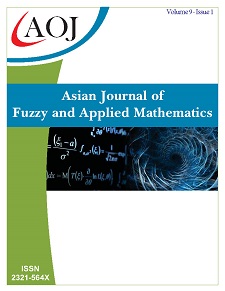A Sustainable Approach for Smart Supply Chain with Quality Humiliation and Carbon Emission Cost
DOI:
https://doi.org/10.24203/ajfam.v9i1.6513Abstract
Most decisive principles affecting customers’ ordering decision is quality of the products. The intention of the work is to provide the sustainable decisions such as order lot-size and total number of lot-size to create a smart SC in view of minimum carbon emissions and joint total cost. This research considers an imperfect production vendor-buyer inventory system involving quality degradation of raw material and carbon emission cost. The vendor’s production process produces some imperfect products, even manufactured products inspect twice, which are examined by buyer and those are return back to vendor in the subsequent shipment. We incorporate the emissions throughout the production processes, transport and storage. Mathematical based inventory model is developed to attain the sustainable decisions which are illustrated numerically.
References
S. Priyan, P. Mala, “Optimal inventory strategies for multi-echelon supply chain system involving carbon emissions and fuzzy deterioration”, International Journal of Logistics Systems and Management, vol. 37, no.3, pp. 324-351
Hoque, M.A. “An optimal solution policy to an integrated manufacturer-retailers problem with normal distribution of lead times of delivering equal and unequal-sized batches”, OPSEARCH, Article in press.
Chun-JenChung. “Investigating imperfect process and demand effects on inspection scheduling and supply chain replenishment policy”, Computers & Industrial Engineering, vol. 64, no. 1, pp. 31-44, 2013.
Darwish M.A, Ben-Daya M, “Effect of inspection errors and preventive maintenance on a two stage production inventory system” International Journal of Production Economics, vol.107, no. 1, pp.301-313, 2007.
BennyMantin, LifeiJiang, “Strategic Inventories with Quality Degradation”. European Journal of Operational Research, vol. 258, no.1, pp. 155-164, 2017.
S.Priyan, R. Uthayakumar, “Mathematical modeling and computational algorithm to solve multi-echelon multi-constraint inventory problem with errors in quality inspection” Journal of Mathematical Modeling and Algorithms in Operations Research, vol. 14, no. 1, pp. 67-89
Gusti Fauza et al., “An integrated single-vendor multi-buyer production-inventory policy for food products incorporating quality degradation”, International Journal of Production Economics, vol.182, no.1, pp.409-417, 2016.
S. Priyan, P. Mala (2020). Optimal inventory system for pharmaceutical products incorporating quality degradation with expiration date: A game theory approach. Operations Research for Healthcare 24 (1) 100245
Li J. et al., “Production and transportation outsourcing decisions in the supply chain under single and multiple carbon policies”, Journal Cleaner and Production, vol. 141, no.1, pp.1109–1122, 2017.
Zhengyi and Jiangtao Hai. “Inventory management for one warehouse multi retailer system with carbon emission cost. Computers and Industrial Engineering, vol. 130, no. 2, pp.565-574, 2019.
Downloads
Published
Issue
Section
License
Copyright (c) 2021 S. Priyan

This work is licensed under a Creative Commons Attribution-NonCommercial 4.0 International License.
- Papers must be submitted on the understanding that they have not been published elsewhere (except in the form of an abstract or as part of a published lecture, review, or thesis) and are not currently under consideration by another journal published by any other publisher.
- It is also the authors responsibility to ensure that the articles emanating from a particular source are submitted with the necessary approval.
- The authors warrant that the paper is original and that he/she is the author of the paper, except for material that is clearly identified as to its original source, with permission notices from the copyright owners where required.
- The authors ensure that all the references carefully and they are accurate in the text as well as in the list of references (and vice versa).
- Authors retain copyright and grant the journal right of first publication with the work simultaneously licensed under a Attribution-NonCommercial 4.0 International that allows others to share the work with an acknowledgement of the work's authorship and initial publication in this journal.
- Authors are able to enter into separate, additional contractual arrangements for the non-exclusive distribution of the journal's published version of the work (e.g., post it to an institutional repository or publish it in a book), with an acknowledgement of its initial publication in this journal.
- Authors are permitted and encouraged to post their work online (e.g., in institutional repositories or on their website) prior to and during the submission process, as it can lead to productive exchanges, as well as earlier and greater citation of published work (See The Effect of Open Access).
- The journal/publisher is not responsible for subsequent uses of the work. It is the author's responsibility to bring an infringement action if so desired by the author.


